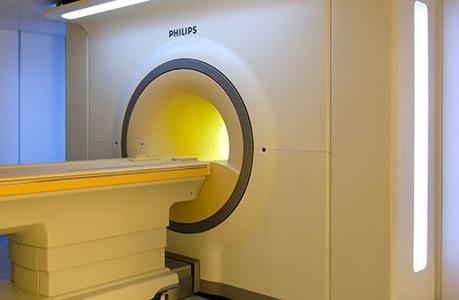
Xpert captions (4)
 Magnetic resonance imaging (MRI) provides unprecedented imaging of the human brain and other soft tissues without involving exposure to radiation. MRI plays a key role in the diagnosis and follow-up of diseases in brain, spine, joints, muscle and inner organs.
Magnetic resonance imaging (MRI) provides unprecedented imaging of the human brain and other soft tissues without involving exposure to radiation. MRI plays a key role in the diagnosis and follow-up of diseases in brain, spine, joints, muscle and inner organs.
Read more
A cutting-edge research infrastructure
Written by Lise Skjold Andersen A cutting-edge research infrastructure that includes six MR scanners offers unique possibilities for translational research. The first Danish ultra-high field (7 tesla) scanner for human use was inaugurated in 2015. This will give unprecedented opportunities to examine how health and disease impact the function and structure of the brain. Read more
A cutting-edge research infrastructure that includes six MR scanners offers unique possibilities for translational research. The first Danish ultra-high field (7 tesla) scanner for human use was inaugurated in 2015. This will give unprecedented opportunities to examine how health and disease impact the function and structure of the brain. Read more
 Collaboration is key! Our research benefits from manifold regional and international research alliances with highly profiled research groups. The DRCMR is embedded in a large diagnostic imaging unit at Hvidovre Hospital providing optimal conditions for close interaction with clinicians and radiologists.
Collaboration is key! Our research benefits from manifold regional and international research alliances with highly profiled research groups. The DRCMR is embedded in a large diagnostic imaging unit at Hvidovre Hospital providing optimal conditions for close interaction with clinicians and radiologists.
 Our overarching goal is to unravel the underlying mechanism in brain development, aging and diseases. We also advance our understanding of how therapeutic interventions act on the brain, for example in patients with multiple sclerosis, Parkinson's disease, traumatic brain injury, dementia, anorexia, schizophrenia, and depression.
Our overarching goal is to unravel the underlying mechanism in brain development, aging and diseases. We also advance our understanding of how therapeutic interventions act on the brain, for example in patients with multiple sclerosis, Parkinson's disease, traumatic brain injury, dementia, anorexia, schizophrenia, and depression.
Group Members
External Collaborators
Assoc. Prof. Annemette Løkkegaard
Copenhagen University Hospital Bispebjerg
Damian M. Herz, MD, PhD
Nuffield Department of Clinical Neurosciences
University of Oxford
Prof. Stéphane Lehericy, MD, PhD
Institut du Cerveau et de la Moelle épinière – ICM,
Centre de NeuroImagerie de Recherche – CENIR, Sorbonne Universités, Paris
Prof. James Rowe
Behavioural and Clinical Neuroscience Institute
Dept. of Clinical Neurosciences, University of Cambridge
Prof. Angela Cenci Nilsson
Lund University
Prof. Andrea Kühn,
Charité - Universitätsmedizin Berlin
Movement Disorders and Neuromodulation Section
Mads Barløse,
Copenhagen University Hospital Hvidovre
Prof. Poul Jennum
Rigshospitalet, Neurocentre
Department of Clinical Medicine
Prof. Ray Dolan
University College London - Imaging Neuroscience
UCL-Max Planck Centre for Computational Psychiatry and Ageing
Rune Asger Vestergaard Frandsen, MD, PhD
Rigshospitalet, Neurocentre
Department of Clinical Medicine
Salvatore Bertino, MD
University of Messina, Italy






